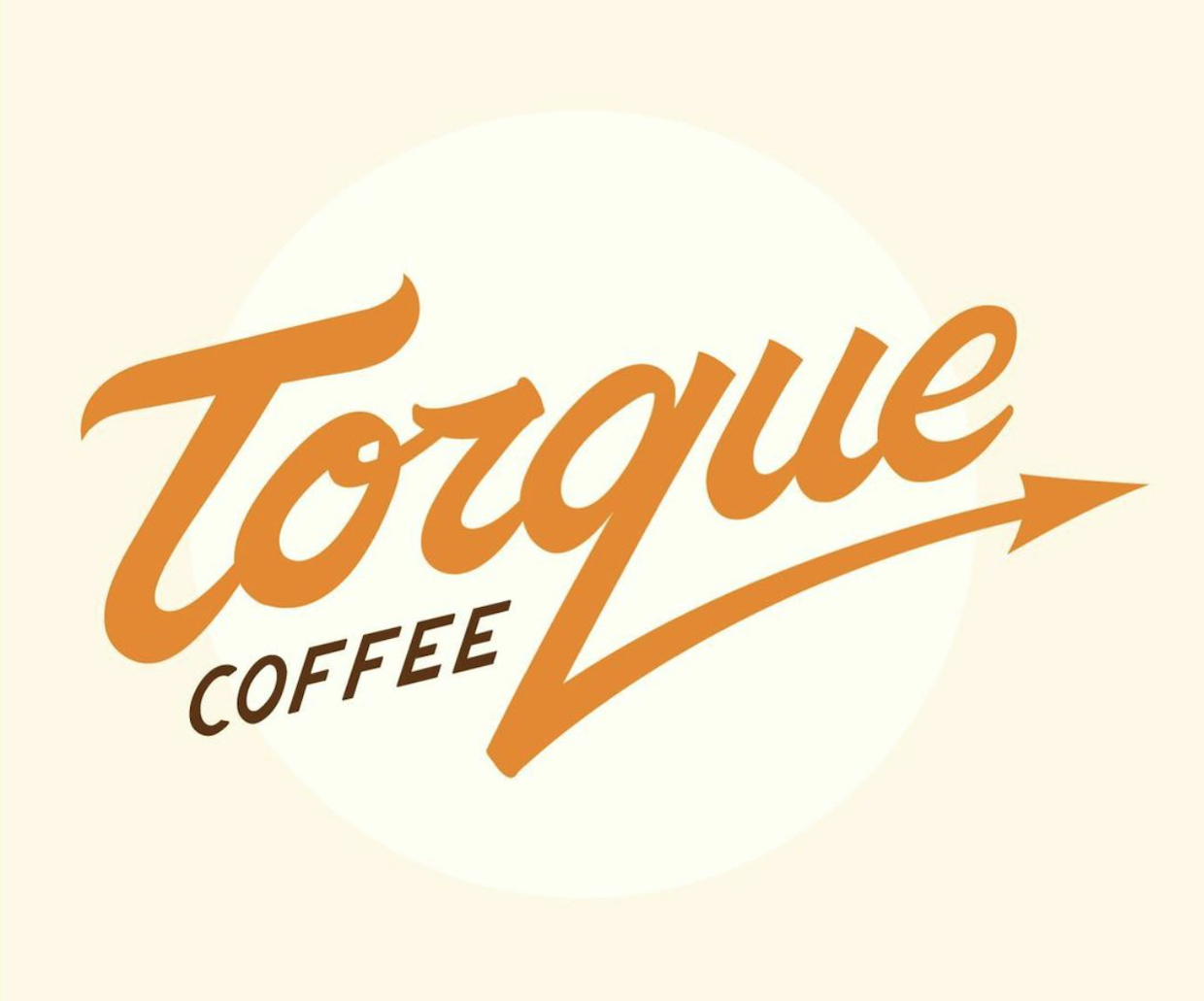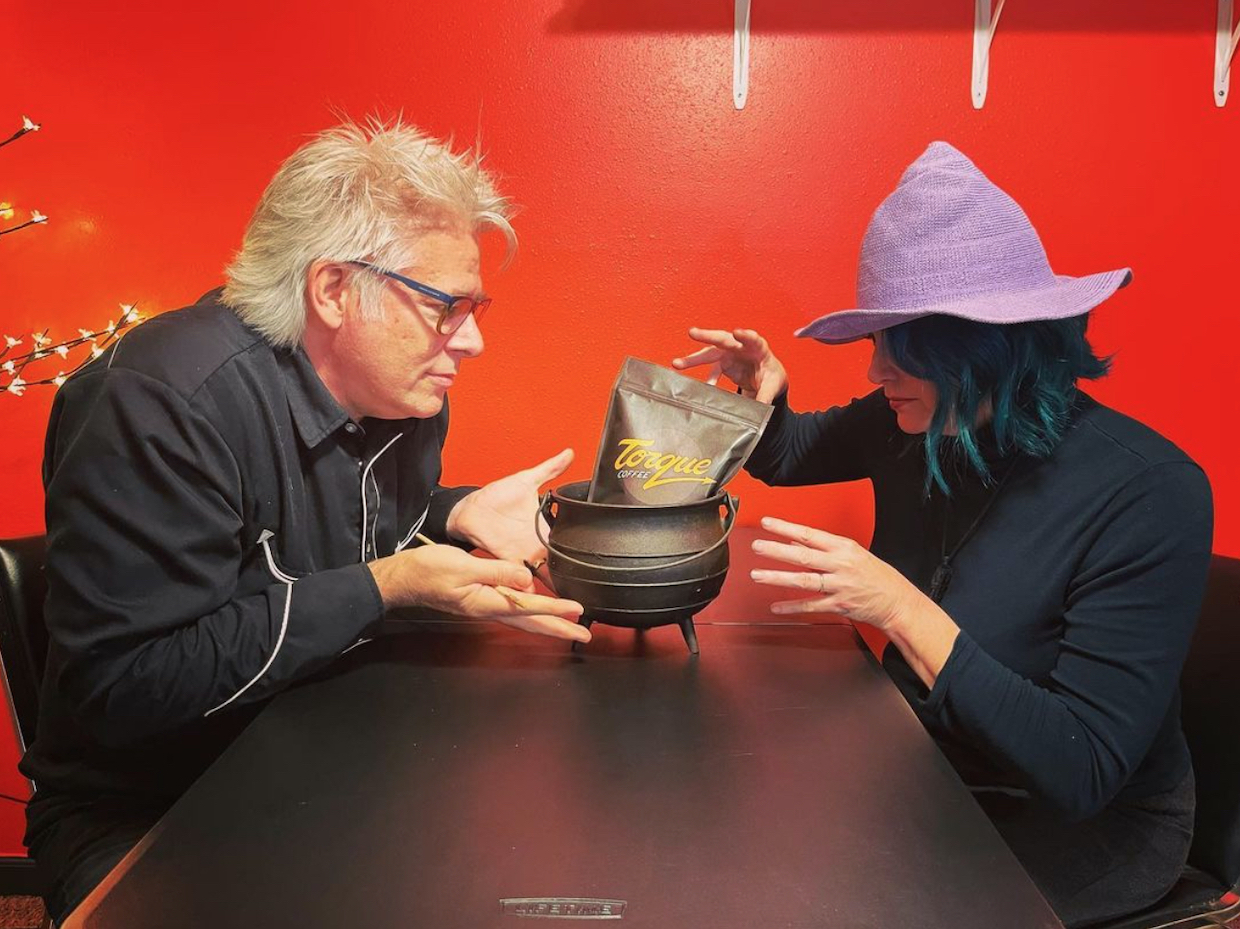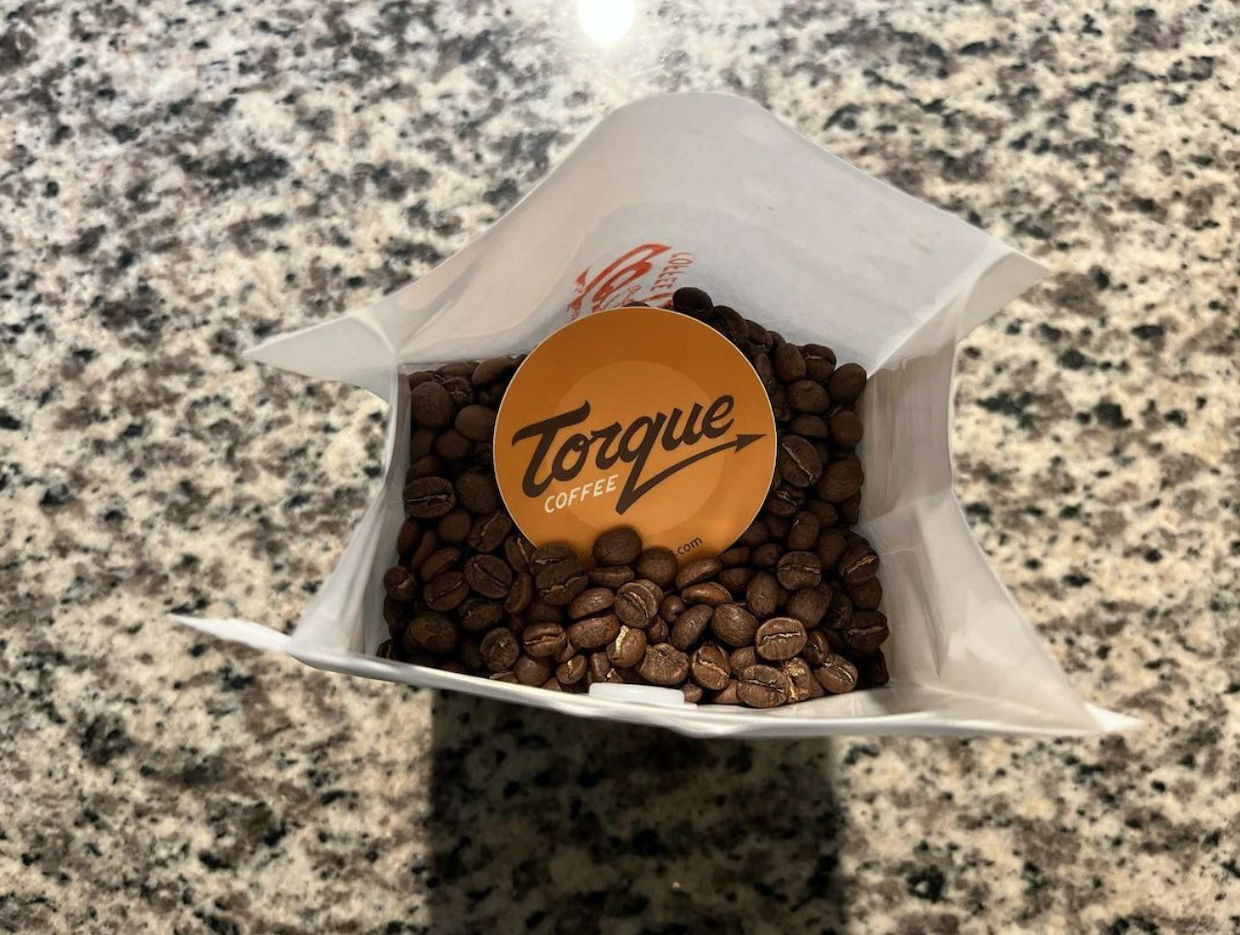
The Torque Coffee logo. All images courtesy of Torque Coffee.
Reflecting decades of pent-up progressive energy in the specialty coffee industry, a new coffee roasting company called Torque Coffee is seeking to be a force for change in coffee’s value structure.
Specifically, the company is basing the purchase price for high-quality arabica green coffee on what it is worth, rather than on what it costs.
Created by coffee roasting veterans Nanelle and Andy Newbom in San Diego, Torque Coffee is built upon a model the Newboms call “proportional pricing,” through which coffee farmers or producers are paid a fixed percentage price associated with the retail price of the roasted coffee bag.
In short, producers receive 20% of the retail price of Torque Coffee bags, which are currently priced at $20. After calculating loss due to shrinkage during roasting and other expenses, the farmgate-level price paid to farmers is $4.75 per pound of green coffee. Adding symmetry to the equation is the fact that 20% is the same proportion per bag that Torque counts as profit.
In interviews with DCN, the Newboms said the model is explicitly designed to buck the existing norms of coffee purchasing, where value distribution heavily favors coffee roasters and retailers over producers, thanks to conventional market structures like commodities-driven pricing.
“Promotional pricing is what we want to use to break the supply chain,” Andy Newbom, the co-author of the book Coffee Spanish for Coffee Buyers, recently told DCN. “The whole point is the market is not broken. It’s not broken but price is anchored or screwed into the producers. And then, on the other end, it is not anchored anywhere. So the only way you can make a supply chain really work — to give it a little equilibrium, a little balance — is by screwing it into both ends.”
Related Reading
- The Third Wave Myth: Inside a Marxist Takedown of High-End Coffee’s Value Structure
- The Specialty Coffee Transaction Guide Puts Price Increases In Perspective
- Direct Trade is Dead, Long Live its Founding Principles
Nanelle Newbom is leading the company’s roasting efforts inside the California Coffee Collective in nearby San Marcos, California. With compostable packaging, a new Torque offering is released every other week for single purchases or discounted subscription purchases, with shipping in reusable boxes.
The company’s first offerings were made possible through “spot purchases” — i.e. purchases of green coffees importers already had in stock. A standard practice among roasting companies, the spot purchasing also put Torque in the odd position of figuring out how to retroactively pay producers more in order to meet the $4.75 farm-gate threshold.
Moving forward, the Newboms plan to leverage their two decades’ worth of connections in the specialty coffee industry to purchase coffee through forward contracts, a strategy that is often out of reach for roasting companies of their modest size.
“We talked to importers and they’re like, ‘Wait, you want to pay more than you have to for coffee? Are you crazy?'” Andy Newbom said of the spot purchases. He likened the experience to the early days of the “direct trade” movement, where roasters were willing to increase their expenses and pay more for coffees in pursuit of improved quality as well as more meaningful relationships with producers.
One of those early direct trade pioneers was Barefoot Coffee Roasters, which Andy and Nanelle Newbom co-founded in 2003 before ultimately selling the business. The two have since dipped back and forth into the worlds of both specialty coffee and craft beer.
Nanelle Newbom described the long-simmering Torque model as a kind of gateway through which other coffee businesses might begin to reconsider value within their own supply chains.
“Although it is appropriate to regard ‘the whole’ as more valuable than the sum of its parts, many businesspeople have embraced what I view as a distorted idea that they personally are a value and other contributors are just costs,” Nanelle Newbom told DCN. “I want to flip that… [I] see the model as a comment on broad social and economic issues in a time when executive pay is some ungodly, distorted and grotesque proportion of wealth basically sucked up through a systemic straw from the contribution of others whose compensation is minimized. What if a portion of that total value was by default due to every worker? I don’t see myself accomplishing that, but on this nano-scale, I can model it and hope that people will talk about it. It’s a big idea compressed and simplified.”
Andy Newbom similarly described the Torque model as an evolutionary one, following whatever progress has been made by the “direct trade” or “Third Wave” coffee movements.
“When we started doing direct trade, we thought nobody would do it because it’s a model that didn’t make any sense,” said Andy Newbom. “But enough people have done it; and people have succeeded at it and built really good foundations — both big and small roasters.”
However, Newbom added that much of the sustainability-related language associated with the direct trade and Third Wave coffee movements has been essentially used to death, both by well-intentioned actors and by opportunistic marketers.
“Ethical, sustainable, responsible, fair — all these fuzzy words — they don’t help consumers anymore,” Andy Newbom said. “On our website, there are no pictures of farmers, no pictures of coffee, no smiling faces at origin. We won’t ever have that, because we’re not selling that. What we’re selling is coffee, and we’re simply saying we pay 20% to the producer. That’s it.”
Does your coffee business have news to share? Let DCN’s editors know here.
Nick Brown
Nick Brown is the editor of Daily Coffee News by Roast Magazine.
Comment
4 Comments
Comments are closed.








This is a great move towards ethical pricing. Congrations.
I only have one issue. I don’t understand why coffee roasters feel it is okay to charge the public twenty to forty dollars per pound for coffee. Seriously. While there are many consumers who obviously will pay that, especially when the price is obfuscated by retailers selling in 12 or 10 or less ounces per bag, the high prices seem more destined to keep the profit levels in coffee absurdly high and make coffee unavailable to consumers who can’t regularly pay those prices.
I believe in equity for the farmer and the consumer. There is plenty of money in coffee for us roasters to have a good life.
Hey Dean!!
You rock! In our case we are selling 86-88point coffees direct to consumers. So at $20 we give the producer $4 of that. Which means $4.75 a lb green or green equivalent. Export and import costs we pay on top of that. So on our current two coffees the final EXW price for each coffee was around $6.25 a lb. For both producers our price to them was between 30-40% higher than they had been paid for their coffee. That’s a meaningful number especially at the high end of specialty.
So how about this: you implement Proportional Pricing on all your coffees. Whatever your price points are, choose a percentage and publicly show that on every bag. Whether it’s 15%, 20%, 25% or more. Ideally make it so whatever price the producers WERE getting you pay them more using this model. The price point isn’t the point, just like the exact percentage isn’t the point. It’s reverse engineering the way green coffee is valued.
This is an eye-opening piece. I’m impressed.
One thing I’m wondering is how you make sure the 20% goes to the producers in the end. Based on a trust in importers acting in good faith?
Keisuke: In some ways we are all dependent on the trustworthiness ion exporters and importers. For us we work with people we know for very well and have worked with for dozens of years. People who are trustworthy.
Then we get detailed breakdowns of every cost in the transaction. We make our contracts show those costs, including the amount paid to the producers, and then we get proof of payment of that amount.
When we deal directly wit the producer first its somewhat easier to trace and verify. But fundamentally if you think of exporters and importers as service providers and pay them accordingly, then the whole transaction is far simpler and less opaque.